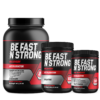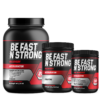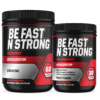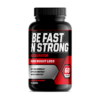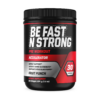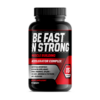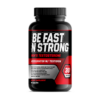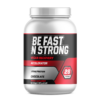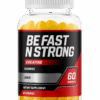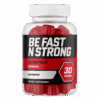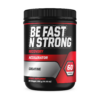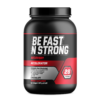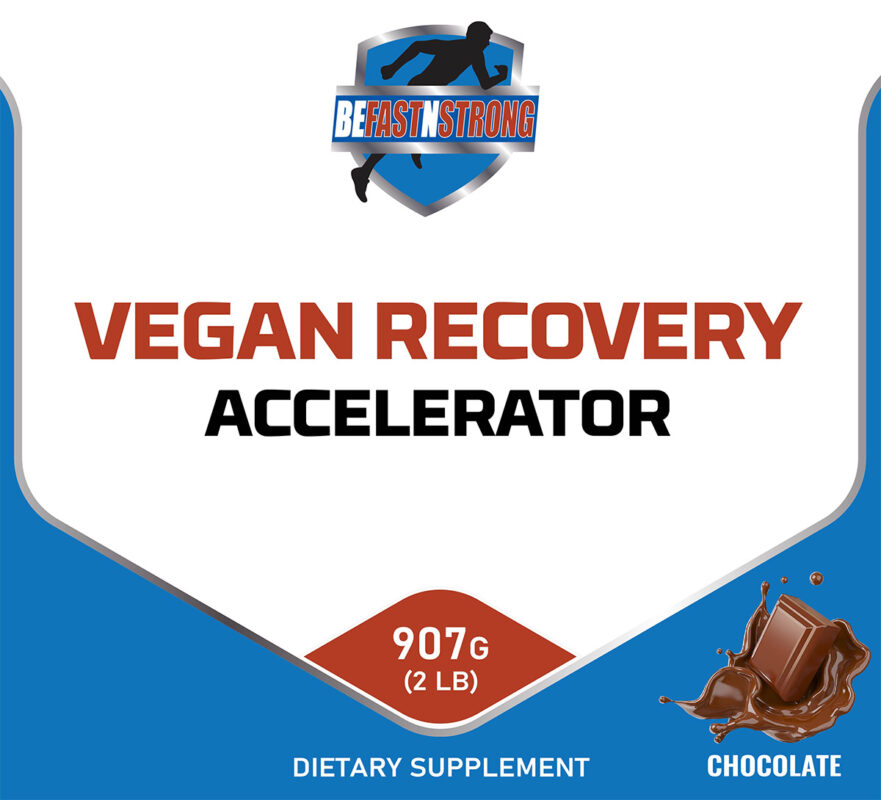The Power of Plant-Based: Benefits of Vegan Protein for Muscle Building and Recovery
For athletes and fitness enthusiasts focused on building muscle, traditional animal-based proteins like whey and casein have long been the go-to options. However, vegan protein sources are quickly gaining recognition for their impressive muscle-building benefits and health advantages. Be Fast n Strong’s vegan protein supplement offers a blend of plant-based proteins, making it a powerful option for those seeking to support muscle growth, recovery, and overall wellness. This blog explores the unique benefits of vegan protein, including its role in muscle building, digestive health, and how it compares to traditional protein sources.
Why Choose Vegan Protein?
Vegan protein sources, such as those found in Be Fast n Strong’s vegan supplement, provide a complete profile of essential amino acids necessary for muscle growth and recovery. Unlike animal-based proteins, plant proteins are free from cholesterol, are lower in saturated fats, and often come with additional nutrients like fiber, antioxidants, and vitamins. Choosing vegan protein can also reduce the environmental footprint, making it a more sustainable choice without sacrificing muscle-building efficacy.
How Vegan Protein Aids in Muscle Building
1. Complete Amino Acid Profile:
• Be Fast n Strong’s vegan protein blend is formulated from sources like pea and brown rice protein, which together provide a complete amino acid profile. This combination ensures the body receives all essential amino acids required for muscle repair and growth, making it comparable to animal-based protein sources (1).
• Studies have shown that pea protein, in particular, is rich in branched-chain amino acids (BCAAs) like leucine, which plays a crucial role in initiating muscle protein synthesis (2).
2. Supports Protein Synthesis and Muscle Repair:
• Amino acids are the building blocks of protein, and protein synthesis is the process by which muscles repair and grow after exercise. Plant-based proteins like those found in Be Fast n Strong’s vegan blend provide leucine, isoleucine, and valine—essential BCAAs that fuel this process (3).
• A study published in the Journal of the International Society of Sports Nutrition found that pea protein, specifically, can produce similar muscle thickness gains as whey protein in resistance-trained individuals (4).
3. Improved Digestibility and Absorption:
• Plant-based proteins are often easier on the digestive system than animal-based proteins, particularly for those with lactose intolerance. Vegan proteins are typically lower in allergens and are gentler on the stomach, which can improve protein absorption and nutrient utilization (5).
• A 2019 study found that pea protein, in particular, was highly digestible, with a digestibility rate similar to that of traditional protein sources like milk protein (6).
4. Anti-Inflammatory and Antioxidant Properties:
• Vegan protein sources such as peas, rice, and hemp contain antioxidants and other compounds that can reduce exercise-induced inflammation, speeding up recovery and improving performance (7).
• Antioxidants play a role in reducing oxidative stress, which is beneficial for recovery. Studies show that plant-based diets rich in antioxidants can help reduce muscle soreness and improve recovery times (8).
Health Benefits Beyond Muscle Building
1. Heart Health:
• Vegan protein sources are typically free from cholesterol and lower in saturated fats, which can benefit cardiovascular health. Research published in The American Journal of Clinical Nutrition has shown that plant-based proteins can help reduce LDL cholesterol levels, which may lower the risk of heart disease (9).
2. Supports Immune Health:
• Many vegan protein sources, such as those found in Be Fast n Strong’s vegan blend, contain naturally occurring vitamins and minerals that support immune function. For instance, pea protein is a good source of iron, which is essential for maintaining energy levels and immune health (10).
3. Sustainability and Ethical Benefits:
• Choosing vegan protein also contributes to environmental sustainability. Producing plant-based protein generally requires fewer resources like water and land compared to animal-based protein sources, making it an environmentally friendly option for athletes and fitness enthusiasts (11).
The Science and Quality Behind Be Fast n Strong’s Vegan Protein
Be Fast n Strong’s vegan protein supplement is crafted with a focus on quality and efficacy, providing athletes with a clean, complete protein source that supports muscle growth and recovery. The blend of pea and rice protein ensures a balanced amino acid profile, and the formula is non-GMO, gluten-free, and free from artificial additives.
Each batch undergoes rigorous testing to ensure it meets the highest quality standards, making it a trusted choice for those who value both their fitness and health. By opting for Be Fast n Strong’s vegan protein, you’re choosing a supplement that prioritizes performance without compromising on purity or sustainability.
Conclusion
Be Fast n Strong’s vegan protein supplement offers a powerful, plant-based solution for those focused on muscle building and recovery. With a complete amino acid profile, improved digestibility, and added health benefits, vegan protein is an excellent choice for athletes of all levels. Whether you’re looking to build muscle, improve recovery, or make a positive impact on the environment, vegan protein provides a well-rounded, effective option.
If you’re ready to enhance your muscle-building journey with a high-quality, plant-based protein, Be Fast n Strong’s vegan protein supplement is here to support you every step of the way.
Footnotes
1. Joy, J. M., et al. “The effects of pea protein supplementation on muscle thickness, strength, and hypertrophy during resistance training.” Journal of the International Society of Sports Nutrition, 2015.
2. Norton, L. E., et al. “Leucine regulates translation initiation of protein synthesis in skeletal muscle after exercise.” Journal of Nutrition, 2006.
3. Tang, J. E., et al. “Ingestion of whey hydrolysate, casein, or soy protein isolate: effects on mixed muscle protein synthesis at rest and after resistance exercise in young men.” American Journal of Clinical Nutrition, 2009.
4. Banaszek, A., et al. “Effects of whey vs. pea protein on body composition and exercise performance in resistance-trained individuals.” Nutrition Journal, 2015.
5. Banaszek, N. et al. “Gut microbiome and muscle mass: The dietary protein link.” Frontiers in Nutrition, 2019.
6. Mariotti, F., & Gardner, C. D. “Dietary protein and amino acids in vegetarian diets.” The American Journal of Clinical Nutrition, 2019.
7. Gleeson, M. “Nutritional support to maintain immune health during exercise.” Journal of Sport and Health Science, 2016.
8. Aune, D., et al. “Plant-based diets and cardiovascular health.” American Journal of Clinical Nutrition, 2017.
9. Clifton, P. M., et al. “Effects of plant protein on blood lipids: A meta-analysis of randomized controlled trials.” The American Journal of Clinical Nutrition, 2016.
10. Craig, W. J. “Health effects of vegan diets.” The American Journal of Clinical Nutrition, 2009.
11. Poore, J., & Nemecek, T. “Reducing food’s environmental impacts through producers and consumers.” Science, 2018.


